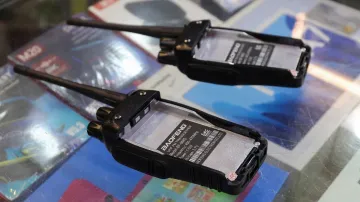Beirut: Lebanese authorities on Thursday banned walkie-talkies and pagers from being taken on flights from Beirut airport, the National News Agency reported, after thousands of such devices exploded during a deadly attack on Hezbollah this week. The Lebanese civilian aviation directorate asked airlines operating from Beirut to tell passengers that walkie-talkies and pagers were banned until further notice. Such devices were also banned from being shipped by air, the Lebanese state news agency reported.
At least 37 people were killed and more than 3,000 wounded when pagers and walkie-talkies used by Hezbollah members exploded in two waves of attacks on Tuesday and Wednesday. Lebanon and Hezbollah, a heavily armed group backed by Iran, say Israel carried out the attack.
Israel has not claimed responsibility.
WATCH: Hand-held radio model said to be used in Hezbollah device explosions
The Lebanese army said on Thursday it was blowing up pagers and suspicious telecom devices in controlled blasts in different areas. It called on citizens to report any suspicious devices. Hezbollah and Israel have been trading fire across the Lebanese-Israeli border for almost a year, in a conflict triggered by the Gaza war.
Pocket bomb
The explosion of thousands of Hezbollah's mobile communication devices has spread fear across Lebanon, leaving people terrified they might be carrying bombs in their pockets. This triggered false rumours across the country. Mustafa Jemaa said he had removed some stock from his electronics shop in the southern city of Sidon. "We had some devices here that we believed were 100% safe, but out of caution, we removed them ... because we got worried," he said.
The Lebanese army on Thursday called on citizens to report any sightings of suspicious objects, adding that it had been conducting controlled explosions of pagers and other devices thought to be rigged. Those killed or wounded in Tuesday's blasts included Hezbollah fighters, medics and administrative staff. At least two of Tuesday's dead were children, killed when pagers belonging to their fathers blew up.
"Of course we're scared, my children, my siblings' children, all of us. Who can feel safe in this situation?" said Mustafa Sibai, a Beirut resident.
"When I heard about what happened yesterday, I left my phone on my motorcycle and walked away," he said.
Ziad Makari, information minister in Lebanon's caretaker government, said panic was to be expected, noting that the attack was "a new type of crime to the Lebanese" and that it had struck people at home, at work and during their daily lives. But he added that "there are many rumours - an intercom blew up, a solar power (system) blew up, a television blew up, a smartphone blew up". "There are a lot of lies ... a lot of fake news and this doesn't help at all," he said.
(With inputs from agency)
ALSO READ: VIDEO: Explosion during funeral of Hezbollah member killed in pager blast
Latest World News
